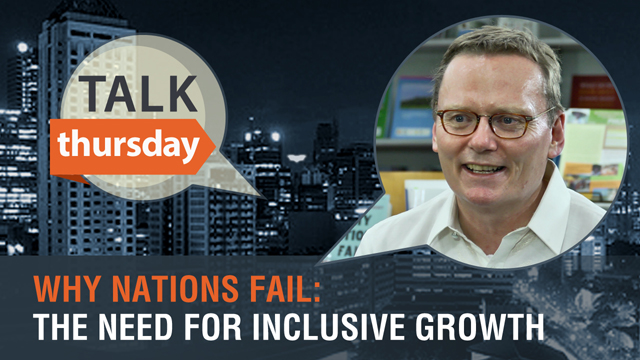SUMMARY
This is AI generated summarization, which may have errors. For context, always refer to the full article.

MANILA, Philippines – Members of the traditional elite with vested interests have kept the Philippines from truly experiencing inclusive growth in the post-Marcos era, according to a renowned economist.
In an exclusive interview with Rappler CEO Maria Ressa, which aired on Thursday, December 6, Why Nations Fail author and Harvard economist James Robinson said the 1986 People Power revolution have opened doors for more inclusivity in the economy and institutions in general.
Robinson said, however, that People Power was only half the job and the administration of President Benigno Aquino III should take the country further and finish all loose ends left after 1986.
He said the road to inclusive economies and institutions is different for every country. What worked in Asian countries like South Korea, may not necessarily work in the Philippines mainly because of the difference in circumstances.
Robinson, however, noted that President Aquino, based on his social contract with the Filipino people, seem to have a good sense of how to go about making changes that will also benefit the masses.
“After the people power in the 1980s there was a lot of progress made toward a different type of political system but getting rid of the personalistic dictatorship is a good thing but many elements of extractive political and economic institutions persist in society,” Robinson said.
“Once Marcos was on the plane out of the country, the people who were organised tend to take over and that [includes] many old elites, traditional elites [and] people with vested interests in monopolies, in a very non-inclusive economy. To keep a non-inclusive economy, they need to keep the political system non-inclusive as well because if the political system became more inclusive you won’t be able to have your monopolies,” he explained.
Watch the interview:
Patronage, OFWs, and dynasties
Robinson said nations fail economically because their political institutions are not designed to be “inclusive.” This means there are not enough incentives and opportunities that are available for all people in society.
He said among the indicators of this is patronage politics, the Overseas Filipino Workers (OFW) phenomenon, and political dynasties. Robinson said patronage politics and vote buying exists because people love it but if there were better institutions, better economic opportunities, this would be lessened.
Robinson said this is the reason why the United States, when it was still in the process of industrializing, came up with secret balloting during elections and institutionalized the election of the Senate. This somehow limited the reach of elite families like the Vanderbilts and the Rockefellers, who, at that time, controlled the Senate.
The lack of opportunities in the country has also encouraged more Filipinos to work abroad as OFWs. While it is good that they send back remittances, Robinson said this “massive exodus” of Filipinos is an indication that the Philippines has extractive institutions.
The Harvard economist also said extractive institutions, the opposite of inclusive institutions, has also encouraged political dynasties simply because they can. Robinson said these families also help extractive institutions stifle economic opportunities and incentives and limit it to just a few.
He said that while political dynasties are present all over the world, not all the scions of great leaders turned out to be good politicians, an example of which is Winston Churchill’s son and grandson who were both members of Parliament but were not as exceptional as him in terms of leadership and achievement.
But, the Philippines, he said is quite unique when it comes to political dynasties since after every term limit, a spouse, a son, daughter, or a sibling takes over the reigns of government. Robinson said this is not seen anywhere else in the world and he was also stumped as to how this happens only in the Philippines.
“It is quite rare and I don’t quite understand why this is so prevalent in the Philippines which makes it difficult to predict how to get rid of it. I’m not sure [how effective they are but] President Aquino, after all, comes from a political dynasty so perhaps political dynasties are not the problem, its just a symptom somehow of the underlying problem of society.”
“Perhaps if you change the institutions, improve the state, make it more accountable you’ll find that there are dynasties and find that dynasties do what people want,” Robinson said.
Education is key
To help change the country’s current path of development, which is unsustainable, Robinson supported President Aquino’s plan to expand education programs and projects in the Philippines.
Robinson said if more people are educated they will have more means to access whatever opportunities and incentives are available in the country. They will be able to get better jobs and earn enough to provide for themselves and their families.
But apart from this, Robinson stressed that education also gives people the power to make educated and sound decisions, whether it be for day to day decision making but, more importantly, big decisions like selecting leaders.
He said under extractive institutions, even education is stifled because the leaders know that when they make education accessible to all, it would also be similar to opening floodwaters that could wash away their rule.
“Education is also important to try to help change the politics, society, to try to help people understand the grievances in society, for helping them to cooperate, coordinate, [and make them less] dependent on patronage or fame or to [better] understand their rights.”
“If I were a politician, I would hope that [education] would also try to change the politics in an enduring way because at the end of the day, most Filipinos suffer under [the current] system, this is not a system that benefits the majority of society,” Robinson said. – Rappler.com
Add a comment
How does this make you feel?
There are no comments yet. Add your comment to start the conversation.